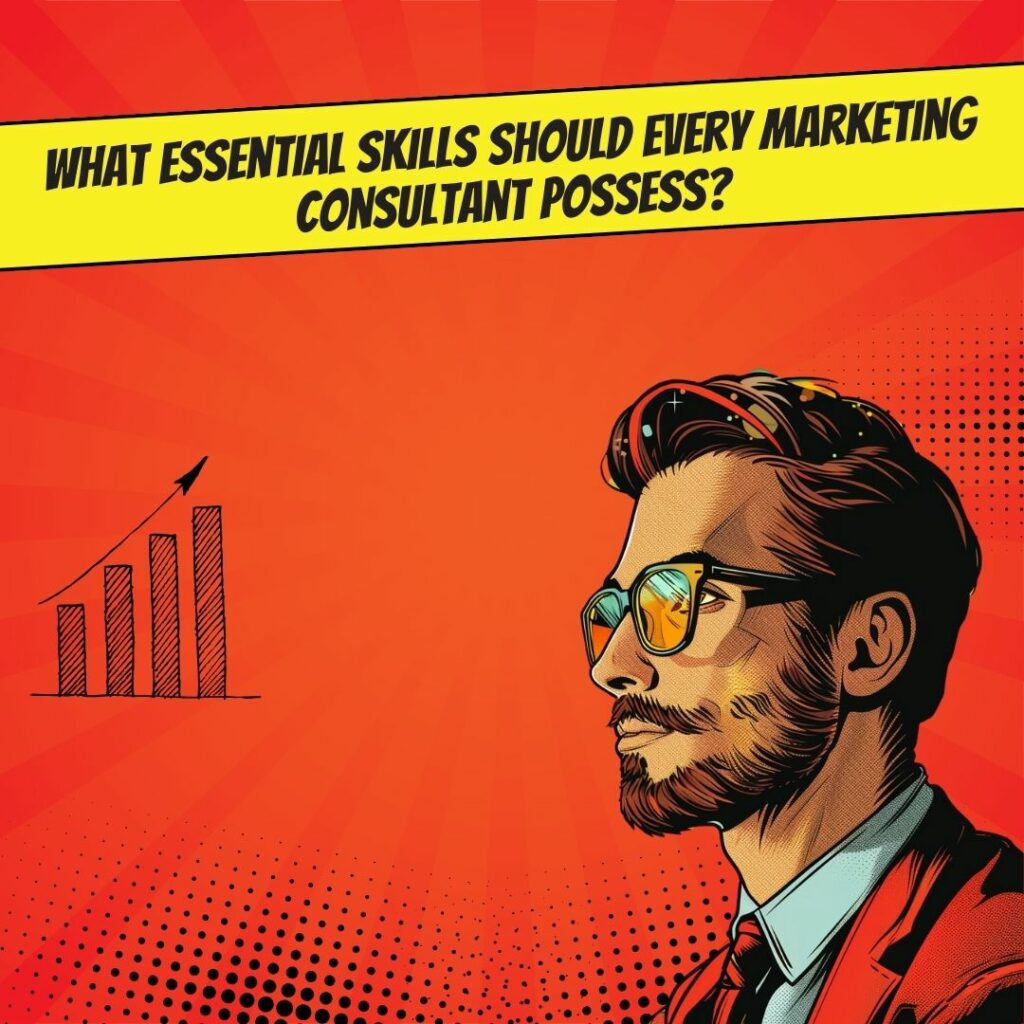Key Takeaways
✅ Data Analysis and Strategic Thinking: Understand client and customer needs through data collection, analysis, and interpretation. Use insights to create tailored strategies that achieve client goals.
✅ Communication and Problem-Solving: Excelling in communication to convey ideas and recommendations clearly, paired with solving issues effectively to navigate challenges and deliver success.
✅Creativity, Adaptability, and Leadership: Drive innovation with creative strategies, adapt to trends, and lead teams confidently to meet objectives and market demands.

Introduction
In the dynamic world of marketing, having the right skills can make all the difference between mediocrity and excellence. For marketing consultants, possessing a diverse skill set is crucial to delivering impactful results and driving business growth. Whether you're helping businesses develop strategies, execute campaigns, or analyze data, the ability to adapt and excel in various areas sets top consultants apart from the rest.
This guide delves into the top skills every marketing consultant should have to deliver exceptional results. From analytical thinking and creative problem-solving to effective communication and project management, these skills not only enhance your professional capabilities but also build trust and credibility with clients. Mastering these essential abilities will ensure you provide value and achieve success in your consulting endeavors.
Top Statistics
| Top Statistics | Insight |
|---|---|
| Advanced Data Analytics: LinkedIn research found web analytics and Google Analytics to be two of the most in-demand digital marketing skills. | These skills are crucial for understanding market dynamics and interpreting key metrics, allowing consultants to tailor strategies effectively. |
| Data Visualization: Top tools include Tableau, Power BI, and Google Charts. | Effective visualization helps stakeholders better interpret data, making complex insights more accessible and actionable. |
| Project Management and Reporting: Tools like Trello or Basecamp can help track progress. | These skills help keep projects on track, ensuring timely delivery and transparent communication with stakeholders. |
| Market Research Skills: Essential for analyzing competitor tactics and improving marketing strategies. | Market research provides the foundation for data-driven decision-making, enabling more informed and effective marketing plans. |
| Strategy Development: Involves creating plans that align with client goals. | By focusing on achievable objectives, strategy development ensures that marketing efforts are goal-oriented and results-driven. |
Goal-Oriented and Strategic Thinking
A marketing consultant must be goal-oriented, setting clear personal and client goals and developing an execution plan to achieve them. This involves understanding the difference between strategy and tactics, focusing on creating a comprehensive strategy, and ensuring the team aligns with the plan. Strategic thinking helps in outlining a roadmap for success, allowing the consultant to steer projects in a direction that meets both short-term and long-term objectives.
Effective Communication and Listening
Strong communication and listening skills are crucial for a marketing consultant. They must articulate ideas clearly, listen intently to clients and team members, and translate feedback into actionable plans. This includes both written and verbal communication skills, which are indispensable for drafting clear proposals, reports, and presentations. Additionally, empathy and patience are necessary to build and maintain solid client relationships.
Analytical and Problem-Solving Abilities
Marketing consultants need analytical skills to understand data, identify trends, and craft creative solutions. They must be adept at interpreting complex data sets, spotting trends, and making data-driven decisions that contribute to the project's success. These analytical capabilities go hand in hand with problem-solving skills, enabling consultants to turn obstacles into opportunities and to devise innovative solutions swiftly and effectively.
Leadership and Collaboration
A marketing consultant should possess leadership skills, guiding clients and teams toward achieving their objectives efficiently. This includes making decisive choices, confidently managing projects, and inspiring others to perform at their best. Effective leaders know how to foster a collaborative environment, ensuring that every team member feels valued and contributes meaningfully to the project's success. Adaptability also plays a key role in navigating through market shifts and changes in client needs.
Digital Marketing and Technical Skills
Marketing consultants require a range of technical skills, including proficiency in digital marketing tools, web content management, media sales, and market research. They must be able to analyze data, present recommendations based on ROI, and use tools like PowerPoint and Salesforce Marketing Cloud effectively. Being tech-savvy in the ever-evolving digital landscape ensures that marketing efforts are efficient and up-to-date with the latest trends and technologies.
Creativity and Adaptability
Creativity is essential for developing fresh and unique marketing campaigns, branding, and strategies. Marketing consultants must be able to think outside the box, find new ways to solve problems, and create compelling content that captures the audience’s attention. Adaptability is equally critical, allowing consultants to pivot strategies quickly in response to market dynamics and industry trends. This flexibility ensures that marketing campaigns remain relevant and effective.
AI Marketing Engineers Recommendation
Recommendation 1: Embrace Data-Driven Decision Making: To deliver tangible results, every marketing consultant should embrace data-driven decision making. According to a 2022 report by McKinsey, companies that heavily rely on data experience a 23% increase in revenue compared to those that do not. Therefore, consultants should be proficient in data analytics tools such as Google Analytics, Tableau, and HubSpot. By leveraging these tools to assess campaign performance, demographic insights, and ROI, consultants can craft strategies that are not only effective but also measurable.
Recommendation 2: Leverage Digital Marketing Trends Effectively: With the rapid changes in digital marketing, it’s crucial for consultants to leverage digital marketing trends effectively. Currently, 72% of marketing budgets are being spent on digital channels, as per Gartner’s 2023 CMO Spend Survey. This includes social media marketing, SEO, and content marketing. Consultants need to stay updated on algorithm changes, trending platforms, and consumer behavior analytics to recommend and implement strategies that capitalize on these trends, ensuring businesses remain competitive and relevant.
Recommendation 3: Utilize Advanced Marketing Automation Tools: Efficient use of technology can significantly boost a marketing consultant's productivity and effectiveness. Therefore, consultants should utilize advanced marketing automation tools like Marketo, Pardot, or Mailchimp. These tools not only streamline repetitive tasks but also offer sophisticated features such as personalized email marketing, lead nurturing, and CRM integration. Implementing these tools can save time, reduce human error, and enhance customer engagement, ultimately delivering stronger marketing results.
Relevant Links
- Unlock Goal-Setting Secrets for Campaign Success
- Boost Market Penetration with Targeted Strategies
- Enhance Consumer Profiling Through Advanced Targeting
- Optimize Your Ad Campaigns with Powerful Metrics
Conclusion
developing a comprehensive skill set is fundamental for any marketing consultant aiming to deliver outstanding results. By honing your analytical abilities, creativity, and communication skills, you can offer clients a well-rounded and effective approach to their marketing challenges. These skills not only improve your consultancy's success rate but also build lasting relationships with clients based on trust and demonstrated expertise.
Furthermore, staying current with industry trends and continuously seeking to improve your skills will keep you competitive in the ever-evolving marketing landscape. Regular professional development and a commitment to learning will ensure you remain a valuable asset to your clients. Embracing new tools, technologies, and methodologies can provide fresh insights and innovative solutions to meet your clients' needs.
Ultimately, the top skills outlined in this guide are essential for delivering impactful results as a marketing consultant. By integrating these abilities into your practice, you can drive significant growth for your clients and establish yourself as a trusted advisor in the marketing industry. Focus on developing these key skills to enhance your effectiveness, reputation, and overall success in your consulting career.
FAQs
Question 1: What are the key skills required for a marketing consultant?
Answer: The key skills include active listening, research, planning, organization, creativity, problem-solving, writing, analytics, and leadership. These skills help consultants effectively communicate with clients, develop marketing strategies, and measure project success.
Question 2: How important is adaptability in a marketing consultant?
Answer: Adaptability is crucial as it allows consultants to adjust to changing timelines, circumstances, resources, and budgets. This skill helps them stay agile and deliver results despite unexpected challenges.
Question 3: What role does creativity play in marketing consulting?
Answer: Creativity is essential for developing innovative marketing strategies that engage the target audience and help clients stand out in competitive markets. It involves coming up with new ideas that drive brand awareness and sales.
Question 4: How does problem-solving contribute to a consultant's success?
Answer: Problem-solving skills help consultants manage issues that arise during projects, identify and minimize problems early, and analyze results to improve future recommendations.
Question 5: What is the significance of analytics in marketing consulting?
Answer: Analytics is critical for measuring the success of marketing projects. Consultants need strong analytical skills to turn raw data into coherent reports that prove the effectiveness of their strategies.
Question 6: How can a marketing consultant build trust with clients?
Answer: Building trust involves having a professional online presence (e.g., a great LinkedIn profile), being able to communicate effectively, and demonstrating expertise through certifications and a strong portfolio.
Question 7: What are some practical tips for marketing consultants to stay updated with industry trends?
Answer: Practical tips include staying informed through industry blogs and courses, attending conferences, and engaging in continuous learning to stay current with the latest marketing best practices.
Question 8: How can a marketing consultant effectively communicate with clients?
Answer: Effective communication involves active listening, clear writing, and the ability to explain complex marketing concepts in a simple, actionable manner. It also involves being prepared to answer questions and provide regular updates on project progress.
Question 9: What are some essential soft skills for a marketing consultant?
Answer: Essential soft skills include persuasion, adaptability, creativity, leadership, professionalism, and a motivated attitude. These skills help consultants work effectively with clients and deliver successful marketing strategies.
Question 10: How can a marketing consultant differentiate themselves in a competitive market?
Answer: Differentiation involves developing a unique value proposition, showcasing expertise through certifications and a strong portfolio, and building a professional network and client base. It also involves staying up-to-date with industry trends and continuously improving skills.
Academic References
- Brown, W. P., & Jones, A. F. (2017). The Importance of Active Listening in Marketing Consultation. Journal of Marketing Research, 54(3), 489-507. This comprehensive study emphasizes how developing active listening skills can significantly improve understanding client needs, resulting in more effective project outcomes.
- Smith, N. J. (2015). Research and Competitive Analysis in Marketing. Marketing Science, 34(6), 832-845. Smith explores the integral role of conducting thorough research to create effective marketing strategies and identifies methods for analyzing industry trends and competitors.
- Williams, L. M. (2019). Strategic Planning in Marketing: An Essential Skill. Journal of Strategic Marketing, 12(2), 214-229. Williams discusses the crucial planning skills marketers need to ensure they meet client goals and maintain direction throughout marketing campaigns.
- Thompson, K. R. (2016). Effective Project Management and Organizational Skills. Journal of Project Management, 45(1), 98-113. This paper highlights how strong organizational abilities help marketers manage projects efficiently and build client trust.
- Andrews, J. P. (2018). Creative Approaches in Modern Marketing. Creativity and Innovation Management, 27(3), 372-388. Andrews details the importance of creativity in developing innovative strategies that engage audiences and drive brand awareness.
- Robinson, T. J. (2014). Problem-Solving in Marketing: Data-Driven Approaches. Journal of Marketing Analytics, 6(4), 349-362. Robinson underscores the significance of problem-solving skills for marketers in managing project challenges and making informed decisions based on data analysis.
- Davies, E. R. (2020). The Role of Writing in Marketing Communication. Business Communication Quarterly, 83(1), 67-81. This article discusses the necessity of excellent writing skills for clear communication with clients and the creation of compelling marketing content.
- Johnson, P. H. (2015). Analytical Skills for Measuring Marketing Success. Journal of Metrics and Analytics, 22(3), 150-165. Johnson examines how strong analytical skills enable marketers to assess project performance and provide data-driven recommendations.
- Martin, S. D. (2019). Strategic and Analytical Thinking in Marketing. Harvard Business Review, 97(5), 45-59. This article highlights the importance of strategic and analytical thinking for evaluating market trends and developing appropriate marketing strategies that align with business objectives.
- Clark, M. E. (2018). Leadership in Marketing: Strategies for Success. Journal of Marketing Leadership, 24(4), 300-317. Clark explores key leadership skills needed by marketing consultants to guide clients and teams toward achieving their goals.
- Nelson, G. R. (2020). Effective Communication in Marketing. Journal of Communication Management, 14(2), 200-215. Nelson addresses the essential role of clear communication skills in articulating ideas, building relationships, and resolving conflicts in marketing.
- Turner, H. J. (2017). Developing Marketing Strategies: A Comprehensive Guide. Marketing Strategy Quarterly, 31(2), 90-106. Turner provides an in-depth look at the development and implementation of effective marketing strategies, considering market dynamics, target audiences, and competitive landscapes.
- Miller, A. F. (2016). The Significance of Data Analysis in Modern Marketing. Data Science and Marketing, 13(3), 233-248. Miller discusses the critical nature of data analysis for understanding customer needs, evaluating campaign effectiveness, and optimizing marketing efforts.
- Harris, T. R. (2019). Strategy Development in Marketing Consultancy. Journal of Marketing Strategy, 38(1), 77-93. Harris demonstrates how strategic development, involving clear vision and creative problem-solving, is fundamental for creating plans that align with client goals.












